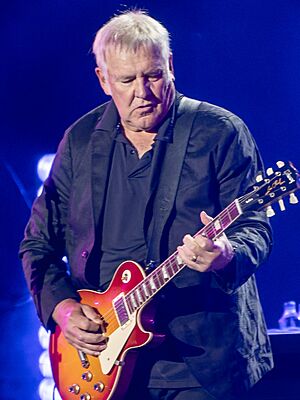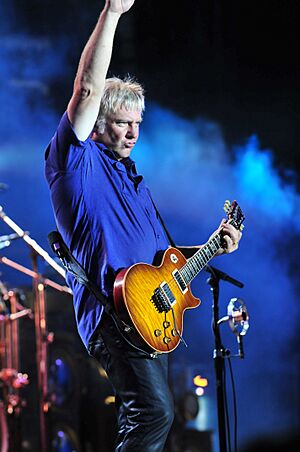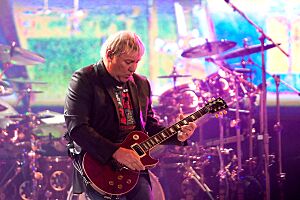Alex Lifeson facts for kids
Quick facts for kids
Alex Lifeson
|
|
|---|---|

Lifeson performing in 2022
|
|
| Background information | |
| Birth name | Aleksandar Živojinović |
| Also known as | Lerxst |
| Born | August 27, 1953 Fernie, British Columbia, Canada |
| Origin | Toronto, Ontario, Canada |
| Genres | |
| Occupations |
|
| Instruments |
|
| Years active | 1963–present |
| Labels | |
Alex Lifeson (born Aleksandar Živojinović on August 27, 1953) is a Canadian musician famous for being the guitarist of the rock band Rush. He started the band in 1968 with his friend, drummer John Rutsey. Soon after, Geddy Lee joined as the singer and bassist. In 1974, Neil Peart became the drummer, completing the band's most famous lineup. This trio stayed together until Rush stopped making music in 2018.
As a member of Rush, Lifeson played electric and acoustic guitars. He also played other string instruments like the mandolin and bouzouki. He sang backup vocals during live shows and sometimes played keyboards. For his work with Rush, he was made an Officer of the Order of Canada in 1996. In 2013, he and the rest of Rush were welcomed into the Rock & Roll Hall of Fame.
Rolling Stone magazine named him one of the 100 greatest guitarists of all time. Besides music, Lifeson is also a painter, a licensed airplane pilot, and an actor.
Contents
Biography
Early Life and First Guitar
Lifeson was born in Fernie, British Columbia, to Serbian parents who had moved to Canada from Yugoslavia. He grew up in Toronto. His stage name, "Lifeson," is an English translation of his birth surname, Živojinović, which means "son of life."
He first learned to play the viola, but at age 12, he switched to the guitar. He was inspired by his brother-in-law, who played flamenco guitar. For Christmas, his father gave him his first guitar. He was influenced by famous guitarists like Jimi Hendrix, Eric Clapton, and Jimmy Page. Lifeson mostly taught himself how to play.
In 1963, he met future Rush drummer John Rutsey at school. They both loved music and decided to start a band together.
Forming the Band Rush
In 1968, Lifeson and Rutsey formed a band that would later become Rush. Lifeson's school friend, Geddy Lee, joined soon after as the lead singer and bassist.
Lifeson is known for his unique guitar riffs, special sound effects, and creative chord structures. He has used a wide variety of guitars and equipment throughout his career.
Rush took a break for several years in the late 1990s. When they returned, they recorded the album Vapor Trails in 2002. For this album, Lifeson used over 50 different guitars to create new and interesting sounds. During live shows, he used foot pedals to trigger different sound effects while he played guitar.
Music Projects Outside of Rush
Solo Album 'Victor'
Besides his work with Rush, Lifeson has worked on other music projects. In 1996, he released his own solo album called Victor. The album's title comes from a poem by W. H. Auden. His son, Adrian, also played on the album.
Envy of None
After Rush ended in 2018, Lifeson formed a new group called Envy of None. In this band, he plays guitar, mandola, and banjo. The band released its first album in April 2022. Their second album, Stygian Waves, was released on March 28, 2025.
Other Collaborations
Lifeson has also played guitar on albums for other artists. He appeared on albums by Platinum Blonde, Lawrence Gowan, and Tom Cochrane. In 2006, he formed a group called the Big Dirty Band to create music for the movie Trailer Park Boys: The Movie. He also played a guitar solo on the song "Anesthetize" by the progressive rock band Porcupine Tree.
Guitar Collection and Equipment

Lifeson has used many different guitars over the years, which helped create his unique sound.
Guitars in the 1970s
In the early days of Rush, Lifeson played a Gibson ES-335 guitar. By 1976, his main guitar was a white Gibson ES-355. He also used a Gibson EDS-1275 double-neck guitar for the song "Xanadu". For amplifiers, he used Hiwatt amps.
Guitars in the 1980s and 1990s
In the 1980s, Lifeson switched to using specially modified Fender Stratocaster guitars. He jokingly called them "Hentor Sportscasters." Later in the 1990s, he started using PRS (Paul Reed Smith) guitars, which he played for about 16 years.
Return to Gibson Guitars
Around 2011, Lifeson went back to playing Gibson guitars, especially the Gibson Les Paul. Gibson even created a special "Alex Lifeson Axcess" model just for him. These guitars have special features that allow him to create a wide range of sounds. For the "Clockwork Angels" tour, he used a black version of this guitar for most of the show.
Influence and Legacy
Many famous guitarists say Alex Lifeson was a major influence on their playing. These include Paul Gilbert of Mr. Big, John Petrucci of Dream Theater, and Steven Wilson of Porcupine Tree.
James Hetfield of Metallica called Lifeson one of the best rhythm guitarists ever. Lifeson's creative and technical style has inspired countless musicians around the world.
Awards and Honors
- 1983: "Best Rock Talent" by Guitar for the Practicing Musician magazine
- 1984 & 2008: "Best Rock Guitarist" by Guitar Player Magazine
- 1991: Inducted into the Guitar for the Practicing Musician Hall of Fame
- 1996: Named an Officer of the Order of Canada with his Rush bandmates
- 2013: Inducted into the Rock and Roll Hall of Fame with Rush
Discography
With Rush
- Further information: Rush discography
Solo Work
| Year | Title |
|---|---|
| 1996 | Victor |
With Envy of None
| Year | Title | Type |
|---|---|---|
| 2022 | Envy of None | Album |
| "Liar" | Single | |
| 2023 | That Was Then | EP |
| 2025 | Stygian Waves | Album |
See also
 In Spanish: Alex Lifeson para niños
In Spanish: Alex Lifeson para niños
 | Roy Wilkins |
 | John Lewis |
 | Linda Carol Brown |


